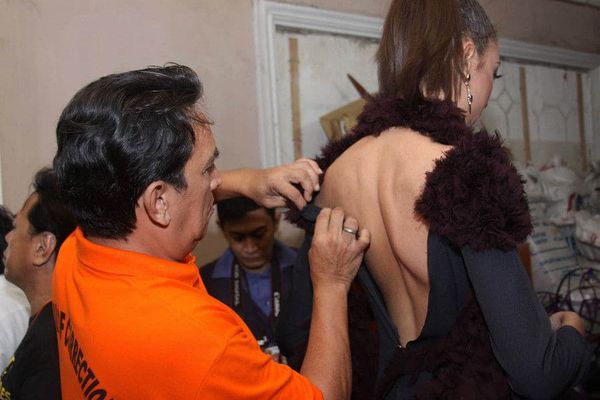Eye For Film >> Movies >> The World's Most Fashionable Prison (2012) Film Review
The World's Most Fashionable Prison
Reviewed by: Jennie Kermode

New Bilibid Prison in the Philippines is home to nearly 17,000 inmates, including murderers, rapists and war criminals. Due to a shortage of funds, it has virtually no internal security, with inmates roaming at will. "It was worse when I first came here," one prisoner recalls. "Then there were two or three deaths a week."
Puey Quinones plans to hold a fashion show there.

At first he was terrified, he admits. He feared a riot might break out or he might find himself kidnapped by terrorists. Now he greets prisoners with a cheerful high five. "I think of him like a sweet little sister," says one. Others read out statements about how much they love him. He tries not to cry.
How did this happen?
It's an intriguing subject, with far more depth than one might expect. Even here, in this impoverished place, efforts are made to educate and train the inmates, whether for the sake of rehabilitation or simply to distract them from trouble. Bored as they are, a good number of them are willing to engage with the lessons Puey offers. They also feel flattered by his interest because he's a big name - at one time one of the country's most celebrated fashion designers (the scandal that sank him is covered in the film's second half). But alongside the simple provision of skills, Puey is offering them a different way of looking at the world. The creative outlet relieves frustrations. The new perspective strengthens community spirit and, despite the rivalries around the catwalk, helps the men to express positive feelings long repressed.
Puey is also somehing of an icon for those who belong to the 'third sex' (the line we would draw between sexual orientation and gender identity being blurry in the Philippines). The prison has a special dormitory where such people can be more secure and express themselves as they wish. One inmate who is happy to stay there swaps rooms with a friend in a traditional dorm when his wife visits. Another regrets a failed marriage and broken relationship with a son, but has found love inside the prison with someone who admires her as a woman. Her initial dislike of her own nature gradually seems to fade in Puey's presence, until he ends up helping her with problems, becoming a loyal friend. Meanwhile, an inmate who admits he was prejudiced against gay people talks about how meeting the designer has changed that.
Of course, none of this would be possible without cooperation from the prisoners themselves, most notably Mike, who is (he says) an innocent man wrongly convicted of murder and struggling to cope with a sentence of 20 to 40 years. Mike's way of holding off despair seems to be working to organise and support the others. Several of the prisoners speak fearfully of how things will be when Puey leaves, but of course, friendships lke this are not so easily broken.
Then there are the clothes. Though there' relaively little focus on fashion here, some of the design work that comes out of the project is remarkably impressive. The final fashion show, with prisoners' relatives steppng in to model, makes the perfect upbeat ending to a story of struggle against the odds. For a film that contains so much suffering, with so many of its protagonists living grim lives, it's impressively buoyant, Puey's optimism lifting the whole venture. Sometimes it's hard to face day to day life, so let's get on with the show.
Reviewed on: 14 Feb 2013














